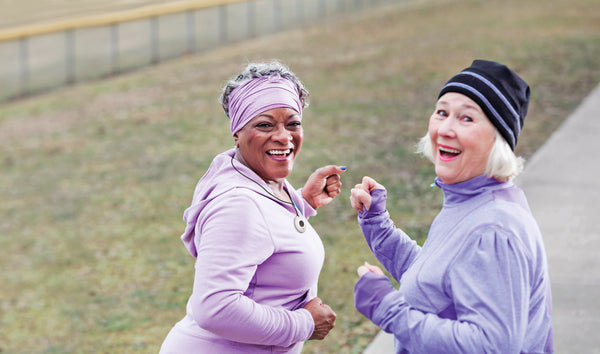Health Updates
The Power of Exercise: Promoting Health and Well-being for Senior Citizens

As we age, exercise becomes increasingly important for maintaining our physical health, mental well-being, and overall quality of life. For senior citizens, regular physical activity is not only beneficial but essential for healthy aging. In this comprehensive article, we will explore the importance of exercise for senior citizens and the numerous benefits it offers. From improving cardiovascular health to enhancing cognitive function and emotional well-being, exercise is a powerful tool that can transform the lives of older adults.
Physical Health Benefits
Regular exercise has a profound impact on physical health, helping senior citizens maintain their strength, flexibility, and mobility. This section will delve into the various physical health benefits of exercise for older adults, including:
- Cardiovascular health: Engaging in aerobic activities such as walking, swimming, or cycling improves heart health, reduces the risk of heart disease, and lowers blood pressure.
- Muscular strength and endurance: Resistance training and weight-bearing exercises help seniors build and maintain muscle mass, preventing age-related muscle loss and improving strength and endurance.
- Joint flexibility and mobility: Stretching exercises and activities like yoga or tai chi enhance joint flexibility, improve balance, and increase overall mobility, reducing the risk of falls and injuries.
- Bone health: Weight-bearing exercises, such as brisk walking or dancing, stimulate bone density, helping to prevent osteoporosis and reduce the risk of fractures.
Cognitive Benefits
Exercise not only benefits the body but also the mind. This section will explore the cognitive benefits of exercise for senior citizens, including:
- Memory and cognitive function: Physical activity has been linked to improved memory, attention, and cognitive function in older adults, reducing the risk of cognitive decline and dementia.
- Mental sharpness and focus: Regular exercise increases blood flow to the brain, promoting the growth of new neurons and enhancing mental sharpness, focus, and cognitive abilities.
- Mood regulation and stress reduction: Exercise stimulates the release of endorphins, the "feel-good" hormones, promoting a positive mood, reducing stress, and alleviating symptoms of depression and anxiety.
Emotional Well-being
Maintaining emotional well-being is essential for seniors to lead fulfilling lives. This section will highlight the emotional benefits of exercise for older adults, including:
- Improved self-esteem and body image: Engaging in regular physical activity can boost self-confidence, improve body image, and enhance overall self-esteem in senior citizens.
- Social connections and engagement: Participating in group exercises, fitness classes, or outdoor activities fosters social connections and provides opportunities for seniors to engage with others, reducing feelings of isolation and loneliness.
- Stress management: Exercise serves as a natural stress-reliever, helping seniors manage daily stressors and promoting a sense of calm and relaxation.
Disease Prevention and Management
Exercise plays a significant role in preventing and managing various chronic diseases commonly associated with aging. This section will explore how exercise can help senior citizens:
- Manage chronic conditions: Regular physical activity can help manage chronic conditions such as heart disease, diabetes, arthritis, and osteoporosis, reducing symptoms and improving overall health.
- Prevent age-related diseases: Engaging in exercise has been linked to a lower risk of developing conditions such as cardiovascular disease, type 2 diabetes, certain cancers, and cognitive decline.
Exercise Guidelines for Seniors
To reap the full benefits of exercise, it's important for senior citizens to engage in safe and appropriate activities. This section will provide guidelines and considerations for seniors starting or maintaining an exercise routine, including:
- Consulting with a healthcare professional: Before starting an exercise program, seniors should consult with their healthcare provider to ensure their safety and address any specific concerns or limitations.
- Choosing the right activities: Seniors should focus on a combination of aerobic exercises, strength training, balance exercises, and flexibility activities that suit their abilities and preferences.
- Starting slow and progressing gradually: Seniors should start with low-impact activities and gradually increase intensity and duration to avoid injuries and allow the body to adapt.
- Listening to their bodies: Seniors should pay attention to their bodies, pacing themselves, and modifying exercises as needed to accommodate any discomfort or limitations.
- Staying hydrated and practicing proper nutrition: Seniors should prioritize hydration and maintain a well-balanced diet to support their exercise routine and overall health.
Exercise is a powerful tool for promoting health, well-being, and independence among senior citizens. From improving physical health and cognitive function to enhancing emotional well-being and disease prevention, regular exercise offers numerous benefits that positively impact every aspect of seniors' lives. By incorporating exercise into their daily routine, seniors can enjoy a higher quality of life, maintain their functional abilities, and age gracefully. It is never too late to start reaping the rewards of exercise, and with the proper guidance and considerations, senior citizens can embark on a journey of improved health and vitality.







